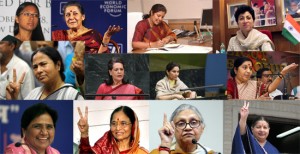Very recently, Rahul Gandhi, the vice president of Congress party while addressing a rally, said that he wanted more and more participation of women in politics. And parallel to it, the issue of women reservation bill was also in news for not seeing the light of the day. But the current scenario of women empowerment or participation in politics-whatever you may call it still remains very gloomy.
If we talk about empowerment then the noticeable reality is that with the changing scenario, we now have more and more women entering into the political foray. Top political parties like Congress have a woman president i.e. Sonia Gandhi and the leader of opposition in Loksabha of BJP is also a woman i.e. Sushma Swaraj. So, this is not mere tokenism but the real face of women participation in politics.
Gone are the days when politics was considered as an all-men-job. As of now, we can see many young women being appointed as spokespersons of political parties. The Women reservation bill is another milestone to ensure participation of women in politics by ensuring 33% of seats reserved for women in parliament. Many electoral seats are reserved for women so that more and more ladies come forward and participate in electoral politics.
Women like Jayalalitha, Mayawati and Mamta Banerjee are some of the women chief ministers of states in India and they have proved that that have better administration skills than their male counterpart. After all the youngest parliamentarian as of now is also a woman-Agatha Sangama (27 years).
But the Tokenism side of the argument also stands strong. There are only 59 women MPs in the 15th loksabha, so all the big bold arguments of women participation in politics seem to be just loose talk.
Many of the women politicians like Sonia Gandhi, Jasmeet Kaur Badal and others belong to strong political families. So, their presence in politics can’t be seen as women empowerment. The grass root scene for women is very different. Even though there are women reserved seats, but the reality over there is different. Women are only made as the face of the electoral campaign as a candidate but the real power and authority lies with the males of their family.
They remain to be a rubber stamp and the powers of their position are exercised by the male members- best example of tokenism. There are too many entry barriers for women in politics.
Because of the processes laid down in the system to enter politics, a larger lot of women are prevented from making a dent in the political scenario. Even in student union politics, we see male dominated elections and the environment is such that girls hardly participate in such elections.
The fact that women participation in politics has improved is irrefutable. But we can’t say that the current picture of women in politics is very contending. At grass root level, women face many hurdles to enter politics. The current system of politics in India needs to be altered in such a manner that it empowers women to voluntarily enter the political arena without the fear and repercussions of their safety.




0 Comments